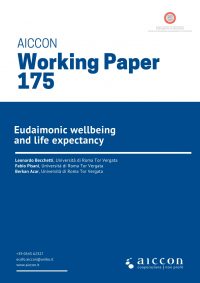175 – Eudaimonic wellbeing and life expectancy
Abstract
We investigate the relationship between eudaimonic wellbeing (sense of life) and subjective survival probability (SSP), a proxy of self-assessed life expectancy.
We find a robust and strong positive relationship after controlling for self-assessed health, coupled with a negative effect of sense of life on mortality.
The magnitude of the first effect is relevant since the minimum difference between individuals declaring highest versus lowest sense of life is a 16-point higher probability of being alive at the target age.
The combination of our two main findings implies that when respondents declare high sense of life they attribute to themselves lower mortality risk and they are correct.
JEL Numbers: I31, I14.
Keywords: purpose in life, subjective survival probability, mortality.

